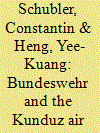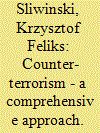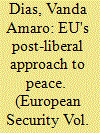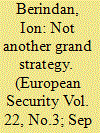|
|
|
Sort Order |
|
|
|
Items / Page
|
|
|
|
|
|
|
| Srl | Item |
| 1 |
ID:
123567


|
|
|
|
|
| Publication |
2013.
|
| Summary/Abstract |
The article sets out to investigate Germany's involvement in the controversial 2009 Kunduz air strike in Afghanistan. Utilizing a theoretical framework derived from existing literature on postheroic warfare, it employs a detailed case study of this particular military engagement to highlight the operational, strategic, and cultural dimensions of Germany's operations in Afghanistan. Through an analysis of primary documents and field interviews, this paper concludes that German public opinion, politicians, soldiers and media reacted in ways that mirror closely theories of postheroic warfare. These included widespread condemnation of the air strike, increasing doubts about the Afghan mission, and emphasis on low-risk stand-off precision weapons, which paradoxically resulted in higher civilian casualties. Germans still have a long way to go to accept the brutal realities of military engagements that the Bundeswehr increasingly confronts during its expanded scope of post-cold war military operations.
|
|
|
|
|
|
|
|
|
|
|
|
|
|
|
|
| 2 |
ID:
123563


|
|
|
|
|
| Publication |
2013.
|
| Summary/Abstract |
The global war on terror and 9/11 have brought to our attention the perpetual problem of freedom versus security. The more governments strive to provide security, the more they tend to curb the freedoms of their citizens. 'Stop and search' procedures, 28-day detentions of terrorist suspects without charge or new body scanners at the airports are just the 'tip of the iceberg' in a long list of the state's encroachments into our private lives. This paper departs from such a seemingly inescapable predicament. It analyses the role of the public in preventing, protecting and preparing for terrorist attacks under the British government's counter-terrorism strategy known as CONTEST. It explores two social phenomena that are being increasingly promoted by official authorities in the United Kingdom, namely, mobilisation of society and what the author terms 'civilianisation' of security. The latter is defined as a notion relating to non-military, voluntary organisations and the business/private sector, engaged by government but acting in its own right against terrorism threats. 'Civilianisation' of security is also conceived of as a potential tool to bridge the gap between two incompatible worlds of state security and personal freedoms.
|
|
|
|
|
|
|
|
|
|
|
|
|
|
|
|
| 3 |
ID:
123566


|
|
|
|
|
| Publication |
2013.
|
| Summary/Abstract |
This article analyses what may be termed as the European Union's (EU) post-liberal approach to the Moldova-Transnistria conflict. Since 2003, within the ENP framework, the EU has become increasingly committed to its transformation. Such an engagement is further confirmed by the establishment of the European Union Border Assistance Mission to Moldova and Ukraine (EUBAM) in 2005, aimed at building confidence between the parties, stimulate their economic interdependence and change perceptions about the conflict. The mission's outcomes are moving beyond its technical scope, supporting the conflict peaceful transformation. The focus on bottom-up initiatives and local engagement allows for a broader understanding of the complex dynamics underlying the conflict, which together with the high-level negotiation process may provide a holistic approach to its resolution and increase the likelihood to reach a sustainable settlement.
|
|
|
|
|
|
|
|
|
|
|
|
|
|
|
|
| 4 |
ID:
123568


|
|
|
|
|
| Publication |
2013.
|
| Summary/Abstract |
Sarkozy's decision to bring France back into NATO's integrated military structure in 2009 represents in some ways a break with French exceptionalism. But how deep is this change? This article examines whether the decision has led to a real integration of France along various dimensions of integration; whether the decision represents a continuation or a break with the traditional French approach and the effects of this reintegration on NATO/EU cooperation. The empirical analysis of French political and military practices in NATO combines a focus on macro-level foreign policy formulations with a micro-level study of how French officials and representatives communicate and interact on a day-to-day basis. The analysis shows that France has become increasingly integrated into NATO since 2009 on most dimensions except with regard to cultural integration. Thus, France may be reintegrated in practice, but not yet in principle.
|
|
|
|
|
|
|
|
|
|
|
|
|
|
|
|
| 5 |
ID:
123564


|
|
|
|
|
| Publication |
2013.
|
| Summary/Abstract |
The Common Security and Defence Policy (CSDP) epitomises the EU's aspirations to be a key actor in global security. The logic underlying the policy, however, remains contentious. In order to elucidate the latter, this article compares the plausibility of different theoretical frameworks. It suggests that liberal IR theory offers considerable explanatory power in this respect, and argues that the decisive forces behind CSDP operations are governmental interests as defined by domestic expectations. European governments' shared interest lies in being perceived to effectively further national interests and domestically held values. Yet, this preoccupation with domestic politics also entails and explains CSDP's often-noted inconsistencies and constraints.
|
|
|
|
|
|
|
|
|
|
|
|
|
|
|
|
| 6 |
ID:
123562


|
|
|
|
|
| Publication |
2013.
|
| Summary/Abstract |
The article argues that NATO is a nuclear-addicted alliance. It focuses on how the addiction developed, the damage caused by the addiction and ways in which it may be overcome. After outlining the origins to NATO's nuclear addiction, the article turns to the recent defence and deterrence posture review (DDPR), which is seen as a classic example of 'addict behaviour' spoiling the best chance NATO has had for overcoming its addiction. The article offers an assessment of the DDPR, portraying the outcome of the process as not only a lost opportunity, but unfortunately also as a position that limits the possibilities for reaching a constructive agreement on the important question of the remaining non-strategic nuclear weapons based in Europe. The article ends by suggesting 12 steps for NATO to overcome its addiction, although it is acknowledged that the DDPR has severely restricted NATO's room for maneuver leaving only a slim chance for 'complete recovery'.
|
|
|
|
|
|
|
|
|
|
|
|
|
|
|
|
| 7 |
ID:
123569


|
|
|
|
|
| Publication |
2013.
|
| Summary/Abstract |
The article advocates that the current proposals for a new European security strategy aim to a similar or even more ambitious strategy than the original 2003 one, calling in effect for a European 'grand strategy' in world affairs. Taking into account the original aims and consequent results of the initial European security strategy and related documents, it argues that the European Union (EU) was not and is still not prepared to undertake a security project of such scope due to severe limitations in terms of structure, capabilities and learning curve, now and in the near future. Rather than insisting with an approach that produced very little, the EU should abandon the traits of a grand strategy in favour of a more realistic and restrained project that could focus on security matters in its neighbourhood including the problematic Russian and Turkish issues while relying on better transatlantic relations and true multilateralism.
|
|
|
|
|
|
|
|
|
|
|
|
|
|
|
|
| 8 |
ID:
123565


|
|
|
|
|
| Publication |
2013.
|
| Summary/Abstract |
This article examines the case of the Community Foundation for Northern Ireland's (CFNI) experience as a primary recipient of peacebuilding aid from the European Union (EU) under the Special EU Programmes Body Special Support Programme for Peace and Reconciliation in Northern Ireland (SEUPB-EUSSPPR). The case serves as a lens into the tensions that such efforts create for community-based organizations as they seek both to honor their funder's accountability claims and their own needs to ensure legitimacy and efficacy with those with whom they interact so as to secure space and discretion to seek to catalyze social experimentation and learning. This paper argues the Foundation's experience and frustrations with EU accountability claims point up a difficulty with the SEUPB's comprehensive conceptualization of peacebuilding: It tends in practice to favor Union-prescribed aims and objectives over those its 'partners' derive from their daily efforts.
|
|
|
|
|
|
|
|
|
|
|
|
|
|
|
|
| 9 |
ID:
123570


|
|
|
|
|
| Publication |
2013.
|
| Summary/Abstract |
This article asks why the Government of Poland participated in the invasion of Iraq in March 2003 when a large majority of the Polish public was opposed to national involvement in Iraq. The aim is to further an understanding of the circumstances under which democratic governments ignore public opinion in their foreign policy decision-making. The article argues that a combination of three circumstances increased the willingness of the government to ignore the public. First, the Iraq issue had relatively low salience among the Polish voters, which decreased the domestic political risks of pursuing the policy. Second, the government's Iraq policy was supported by a considerable consensus among the political elite. Third, the political elites were unified in their perceptions that participating in the invasion would yield essential international gains for Poland.
|
|
|
|
|
|
|
|
|
|
|
|
|
|
|
|
|
|
|
|
|